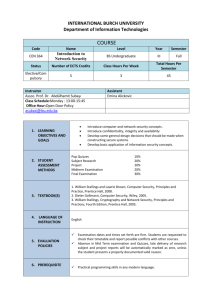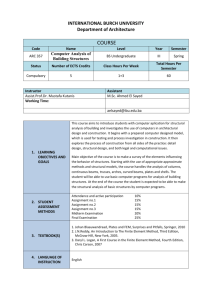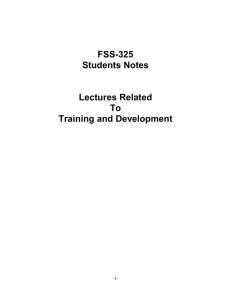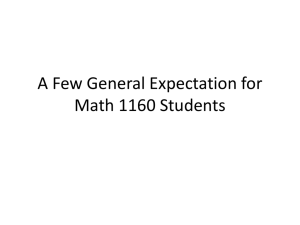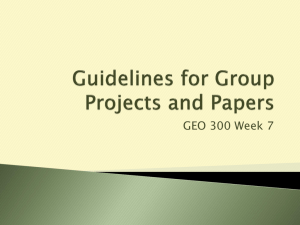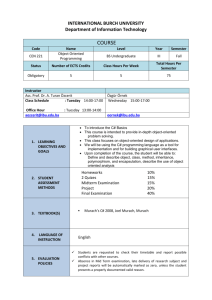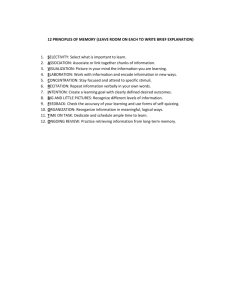Midterm Examination 20%
advertisement
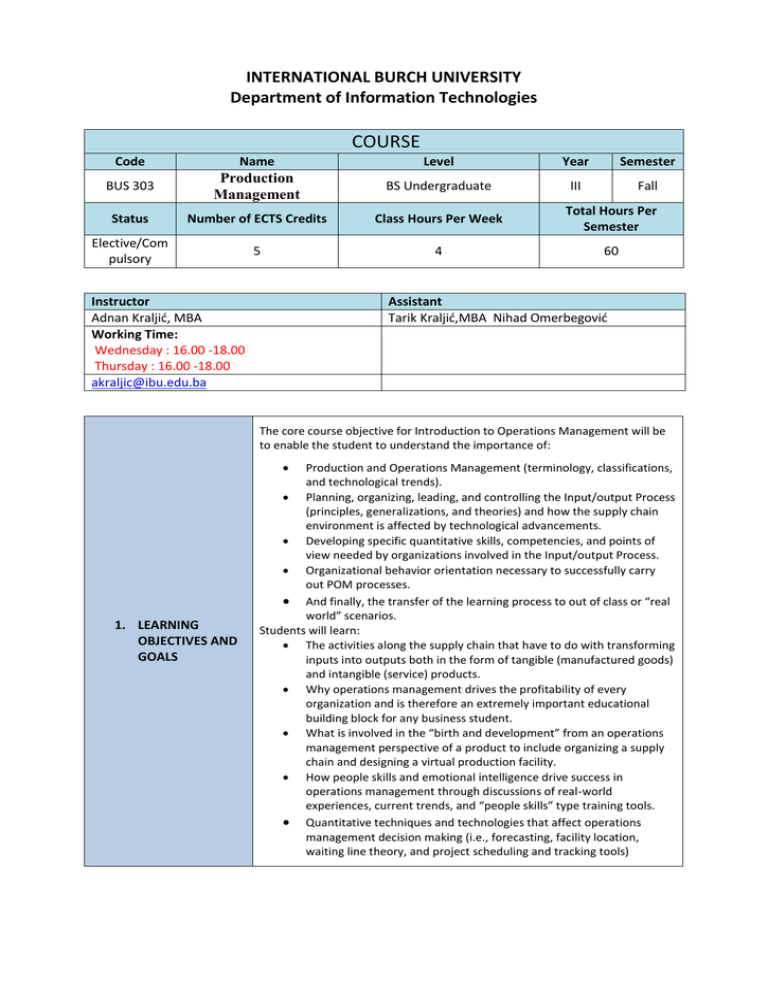
INTERNATIONAL BURCH UNIVERSITY Department of Information Technologies COURSE Code Name Level Year Semester BUS 303 Production Management BS Undergraduate III Fall Status Number of ECTS Credits Class Hours Per Week Total Hours Per Semester Elective/Com pulsory 5 4 60 Instructor Adnan Kraljić, MBA Working Time: Wednesday : 16.00 -18.00 Thursday : 16.00 -18.00 akraljic@ibu.edu.ba Assistant Tarik Kraljić,MBA Nihad Omerbegović The core course objective for Introduction to Operations Management will be to enable the student to understand the importance of: 1. LEARNING OBJECTIVES AND GOALS Production and Operations Management (terminology, classifications, and technological trends). Planning, organizing, leading, and controlling the Input/output Process (principles, generalizations, and theories) and how the supply chain environment is affected by technological advancements. Developing specific quantitative skills, competencies, and points of view needed by organizations involved in the Input/output Process. Organizational behavior orientation necessary to successfully carry out POM processes. And finally, the transfer of the learning process to out of class or “real world” scenarios. Students will learn: The activities along the supply chain that have to do with transforming inputs into outputs both in the form of tangible (manufactured goods) and intangible (service) products. Why operations management drives the profitability of every organization and is therefore an extremely important educational building block for any business student. What is involved in the “birth and development” from an operations management perspective of a product to include organizing a supply chain and designing a virtual production facility. How people skills and emotional intelligence drive success in operations management through discussions of real-world experiences, current trends, and “people skills” type training tools. Quantitative techniques and technologies that affect operations management decision making (i.e., forecasting, facility location, waiting line theory, and project scheduling and tracking tools) Pop Quizzes Subject Research Project Midterm Examination Final Examination 2. STUDENT ASSESSMENT METHODS The primary textbook for the course is: Operations Management with MyOMLab, 6/E Nigel Slack Stuart Chambers Robert Johnston. ISBN-10: 0273731602. ISBN-13: 9780273731603 3. TEXTBOOK(S) 4. 10% 20% 20% 20% 30% LANGUAGE OF INSTRUCTION English 5. EVALUATION POLICIES 6. PREREQUISITE Examination dates and times set forth are firm. Students are requested to check their timetable and report possible conflicts with other courses. Absence in Mid Term examination and Quizzes, late delivery of research subject and project reports will be automatically marked as zero, unless the student presents a properly documented valid reason. N/A 7. SCHEDULE OF LECTURES AND READINGS Class Hours Topic Week 1 3 Operations management Week 2 3 Operations performance Week 3 3 Operations strategy Week 4 3 Process design Week 5 3 The design of products and services Week 6 3 Supply network design Week 7 3 Layout and flow diagrams Teaching Methods Lectures, Recitation, Practical Sessions Lectures, Recitation, Practical Sessions Lectures, Recitation, Practical Sessions Lectures, Recitation, Practical Sessions Lectures, Recitation, Practical Sessions Lectures, Recitation, Practical Sessions Lectures, Recitation, Reading The primary textbook for the course is: Operations Management with MyOMLab, 6/E Nigel Slack Stuart Chambers Robert Johnston. ISBN-10: 0273731602. ISBN-13: 9780273731603 Date Week 8 3 Process technology and diagrams Week 9 3 Mid-term Week 10 3 Quality management Week 11 3 Capacity planning and control Week 12 3 Materials requirements planning (MRP) Week 13 3 Inventory planning and control Week 14 3 Supply chain planning and control Week 15 3 Enterprise resource planning (ERP) Practical Sessions Lectures, Recitation, Practical Sessions Lectures, Recitation, Practical Sessions Lectures, Recitation, Practical Sessions Lectures, Recitation, Practical Sessions Lectures, Recitation, Practical Sessions Lectures, Recitation, Practical Sessions Lectures, Recitation, Practical Sessions Plagiarism Notice: Plagiarism is a serious academic offense. Plagiarism is a form of cheating in which a student tries to pass off someone else's work or part of it as his or her own. It usually takes the form of presenting thoughts, terms, phrases, passages from the work of others as one's own. When it occurs it is usually found in essays, research papers or term papers. Typically, passages or ideas are 'lifted' from a source without proper credit being given to the source and its author. To avoid suspicion of plagiarism you should use appropriate references and footnotes. If you have any doubt as to what constitutes plagiarism you should consult your instructor. You should be aware that there are now internet tools that allow each submitted paper to be checked for plagiarism. Remember plagiarism is serious and may result in a reduced or failing grade or other disciplinary actions. Cheating: Cheating in any form whatsoever is unacceptable and will subject you to IBU disciplinary procedures. Cheating includes signing in others for attendance, exams or anything else; using prohibited electronic and paper aides; having others do your work; having others do your work, copying from others or allowing others to copy from you etc. Please do not cheat in any way! Please consult me if you have any questions.

